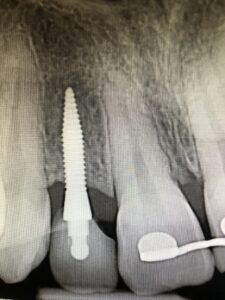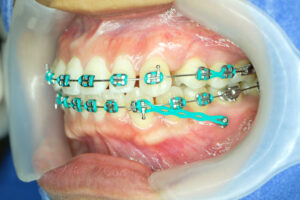Are Mini Dental Implants Right for Me?
 Many people are familiar with dental implants as a treatment option for replacing missing teeth. At Designer Smiles, we pride ourselves on offering a wide array of treatment options for our patients who want to replace missing teeth. Because traditional implants aren’t right for everyone, we also offer mini dental implants. Mini implants have a much more limited range of applications, so it is important to see a highly experienced dentist for their use. We’ll explain here.
Many people are familiar with dental implants as a treatment option for replacing missing teeth. At Designer Smiles, we pride ourselves on offering a wide array of treatment options for our patients who want to replace missing teeth. Because traditional implants aren’t right for everyone, we also offer mini dental implants. Mini implants have a much more limited range of applications, so it is important to see a highly experienced dentist for their use. We’ll explain here.
What are Mini Dental Implants?
Mini dental implants operate along the same lines as any dental implant. They consist of a titanium body, implanted into the patient’s jawbone in order to provide support and anchorage for a replacement tooth or teeth. The difference is the size. Mini dental implants are, well . . . miniature.
They are short and skinny, which means that they can fit into much smaller spaces. Mini dental implants do require a surgical procedure to place them, but they are far less invasive due to their small size.
How are Mini Dental Implants Different from Traditional Dental Implants?
Mini dental implants are anywhere from one-third to one-half the size of traditional dental implants. Just as traditional implants come in a wide range of sizes, so do mini implants. The necessary minimum dimensions of healthy jawbone is much smaller for mini dental implants than for traditional implants.
Due to the less invasive nature of mini implants, even though a surgical procedure is necessary, patients typically have a shorter healing time and less post-operative discomfort.
The smaller size of the implant does translate into less support of the replacement tooth, so we limit mini dental implants to replacing teeth that are both small in size and receive little force during chewing. For permanent tooth replacements, mini dental implants only work well for the replacement of small front teeth.
Which Cases are Better Suited for Mini Dental Implants?
Due to the limited nature of application for mini dental implants, we must be very careful in case selection. Dr. Ann is an expert in all types of dental implants, so she will discuss all options, but she will only recommend the treatment that has a high chance of long-term success.
There are several great uses for mini dental implants, which we will cover here.
Replacement of a Single Missing Front Tooth
 When it comes to replacing a missing tooth with an implant-supported crown, mini dental implants are best (and only) for small front teeth. The shorter length and smaller diameter of a mini dental implant is not adequate for supporting a large back tooth’s crown or the chewing force it receives. The smaller dimensions of a front tooth and the smaller forces it receives during chewing make restoration with a mini dental implant possible.
When it comes to replacing a missing tooth with an implant-supported crown, mini dental implants are best (and only) for small front teeth. The shorter length and smaller diameter of a mini dental implant is not adequate for supporting a large back tooth’s crown or the chewing force it receives. The smaller dimensions of a front tooth and the smaller forces it receives during chewing make restoration with a mini dental implant possible.
Maintenance of Bone for Future Dental Implant
There may be scenarios in which a person knows he or she wants to eventually replace a missing tooth with a dental implant, but is not ready immediately. A mini dental implant can help maintain the health and dimensions of the jawbone while that person waits. Without anything in a missing tooth’s place, the jawbone slowly deteriorates. It shrinks in both width and height, making restoration with a dental implant in the future more difficult.
Your dentist can use a mini dental implant in the site of the missing tooth to stimulate and maintain great jawbone health until the time is right for final implant placement.
Anchorage for a Removable Tooth Replacement
We also use mini dental implants as small anchorage devices for removable tooth replacements like dentures and partial dentures. Traditional dentures simply rest over bone and overlying gum tissues, and partial dentures have clasps that hold onto adjacent teeth for support. By adding anchorage into the bone itself, these types of prostheses achieve much better stability.
They become more comfortable and less likely to cause embarrassing moments of looseness or falling out.
With a partial denture, mini dental implants can reduce the burden placed on the remaining teeth by sharing the support.
Anchorage for Orthodontic Tooth Movement
 A very common use for mini dental implants in dentistry is as anchorage devices for orthodontic treatment. Your orthodontist may place mini implants in various areas of the jaws in order to attach wires or elastic bands to the teeth and provide a certain direction of force. This is especially valuable in difficult to move teeth. The implant’s anchorage into the jawbone provides great stability against which to pull a tooth. This prevents the potential consequence of unintentional tooth movement when another tooth is the source of anchorage. An implant is a much better anchorage than a tooth!
A very common use for mini dental implants in dentistry is as anchorage devices for orthodontic treatment. Your orthodontist may place mini implants in various areas of the jaws in order to attach wires or elastic bands to the teeth and provide a certain direction of force. This is especially valuable in difficult to move teeth. The implant’s anchorage into the jawbone provides great stability against which to pull a tooth. This prevents the potential consequence of unintentional tooth movement when another tooth is the source of anchorage. An implant is a much better anchorage than a tooth!
How Can I Know if I am a Candidate for Mini Dental Implants?
The first step is a consultation! Call Designer Smiles today to schedule an implant consultation with Dr. Ann Haggard. She can answer all the questions you have about any type of dental implant and assess your current situation. At Designer Smiles, our goal is to create beautiful smiles that last for a lifetime!
